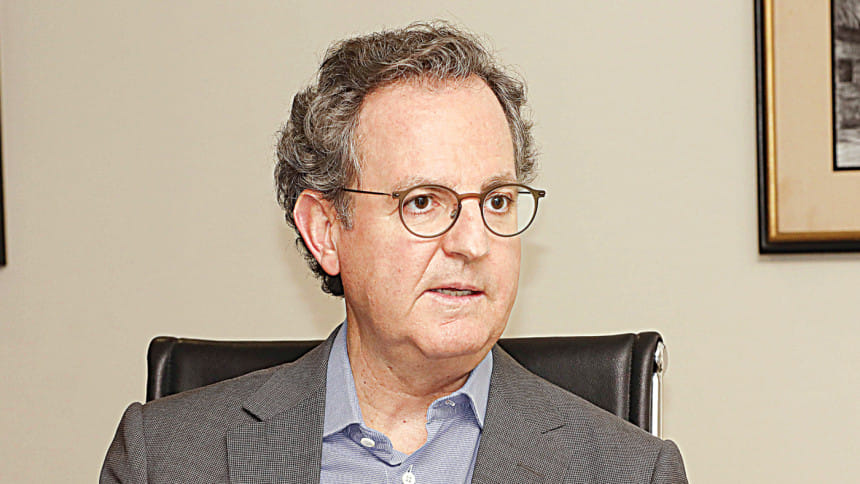Coats plans to go greener in Bangladesh

The UK-headquartered thread manufacturer Coats Group has been expanding its operations in Bangladesh to meet the growing demand from local customers, according to a top official.
The globally leading thread-maker is also opting to go green as it aims to take the "driving seat in sustainability," said David Paja, the group chief executive officer (CEO) of Coats.
In an interview with The Daily Star at a hotel in Dhaka last week, Paja said the group has set targets to use 60 percent recycled content by 2026 and 100 percent non-virgin raw materials by 2030.
Currently, Coats uses 45 percent of its raw materials from non-virgin sources.
In Bangladesh, the thread-maker runs two production plants -- one in Gazipur and another in Chattogram. The Chattogram factory was built 35 years ago, while the second plant was opened in Gazipur in 2002.
The factories employ more than 2,000 workers.
The company says it has been facing growing demand from local customers as Bangladesh's apparel exports have increased substantially. The demand for apparel accessories, such as thread, is also on the rise.
It now supplies sewing thread to more than 800 customers in Bangladesh, Paja said.
He added that the group now looks to produce sustainable and recyclable products, as the demand for items like recycled thread, yarn and apparel has been increasing worldwide due mainly to changing consumer habits in fashion.
According to Paja, the thread business is promising in Bangladesh due to its ready customer base, geographical proximity to manufacturing hubs and the country's large number of manufacturing units.
Moreover, Bangladesh holds a strong position in the global tariff regime and has a solid track record about its apparel might.
Besides, the country gets the benefit from a ready workforce, with more than 20 lakh people entering the job market every year.
The group CEO said that over the last five years, the group has continued to invest in expanding its capacity in Bangladesh, as the market is very promising.
Also, the company has set a target to invest in water recycling processes to reuse 50 percent of its wastewater as part of its sustainability plan.
Coats has been planning its sustainability strategy around five pillars: reducing emissions; transitioning materials from virgin to recycled products; water recycling; ensuring zero waste to landfill; and making Coats a great place to work for its people and promoting female leadership.
Paja said, "Coats has been the global leader in thread for decades, and it has a responsibility. We have decided to take the driving seat in sustainability. We have an energy roadmap for 2050."
Regarding energy costs and availability, Paja said his company has already focused on energy sustainability, which is why energy-efficient tools have been installed at its plants.
The company has invested in heat recovery systems and motors to reduce energy consumption. Currently, 30 percent of the company's energy demand is met by solar panels installed on its rooftops, while 60 percent is generated by the company itself. The remaining 10 percent of the energy requirement comes from the national grid.
When asked whether Bangladesh could benefit from the Trump administration's decision to impose tariffs on China and other countries, Paja said it is difficult to anticipate and forecast.
However, Bangladesh has already benefited from the additional tariffs, as work orders have shifted from China to Bangladesh.
Apart from the apparel accessories sector going green, Paja said the fashion industry itself needs to transform, as consumers are now demanding more sustainable products.
Digital technologies must be further developed, as brands face pressure to provide greater traceability of raw materials and finished products. Digital solutions help consumers trace products accurately, he added.
The group CEO said that three key issues -- sustainability, digital technology and innovation -- will shape the future of the fashion industry; and Coats is well ahead in all three areas.

 For all latest news, follow The Daily Star's Google News channel.
For all latest news, follow The Daily Star's Google News channel. 



Comments